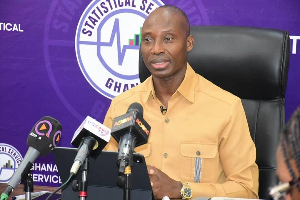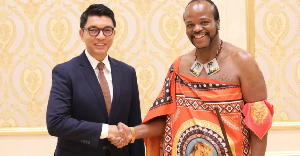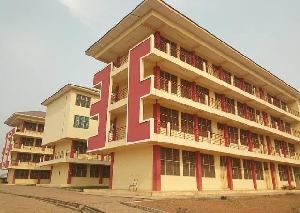Civil Society Organisations (CSOs) have been urged to discuss illegal mining (Galamsey) issues, which is currently on the rise, and come out with workable suggestions that could help halt the menace in the country.
Dr Alfred Sugri Tia, Deputy Minister of Environment, Science, Technology and Innovation (MESTI) who made the call also tasked CSOs to deliberate the issue of illegal chainsaw operations and advise government appropriately.
At the opening of the 6th Annual Civil Society Review of the Natural Resources and Environment Sector on Wednesday in Accra, Dr Tia in a speech read on his behalf said outcomes of such a meeting would be leveraged in shaping policies, legal reforms and environmental practices that have the potential to promote sustainable management of the depleting natural resources.
The annual review platform brings together both state and non-state actors to discuss crosscutting issues whilst deliberating on pertinent issues relating to transparency, accountability and sustainability in the governance of Ghana’s natural resources.
Dr Tia said the natural resource sector contributes substantially to GDP and so Government was committed to dealing with most of the challenges that inhibit it from achieving its aim of ensuring optimal benefit from the resources.
“We know that if we are able to properly address these challenges, the sector could contribute even more towards poverty alleviation through job creation and augment the better Ghana Agenda”.
He explained further that the high rate of natural resources degradation represents an annual cost of about 10 per cent of GDP, representing almost half of Ghana’s US$ 1.5 billion annual official Development Assistance.
He however, said although the cost of environmental degradation had decreased as a share of GDP, as per recent EPA’s estimates, the rate of resource depletion continues to increase, especially in the forest and fisheries sectors.
Dr Tia said the greatest threat to forestry sector is forestry depletion which alone cost government 270 million dollars while inadequate water supply, sanitation and hygiene cost 180 million dollars.
He assured that Government was making effort to address the challenges including issues raised by the CSOs in previous review meetings, whilst various policies were being pursued to deepen natural resources and environmental management practices and enforcement.
He urged all stakeholders to continue to dialogue with government to ensure the sustainable development and management of the resources towards achievement of the Sustainable Development Goals (SDGs).
Mrs Hannah Owusu-Koranteng, Chairperson of Kasa Initiative Ghana, an NGO, said the outcome of the various CSOs annual reviews had formed the basis for engagement with government over the years and through that, CSO’s had been able to influence policies and laws governing the natural resource and environment in Ghana.
She said CSOs expects that in the on-going regulatory reforms in the mining sector, reforms would contain provisions on human rights to protect the rights of people, Free Prior and Informed Consent (FPIC), to empower host communities as well as provisions to protect the environment.
“We note that good governance issues are critical in Ghana’s development processes and CSO’s are ready to contribute to this process through open debate on such issues including participation in the development of the long term development plan of Ghana,” Mrs Owusu-Koranteng added.
She also commended DANIDA and Care International for supporting KASA to organise and host the Review forum and for the support in the development of the five-year Kasa strategic plan that would govern activities between Kasa and other CSOs.
Mr Henry Kerali, Country Director, World Bank, Ghana applauded the review, describing it as an important vehicle for discussing sector achievements and challenges and agreeing on actions for subsequent year.
He said it was vital that all stakeholders in Ghana do their utmost to protect the environment on which the economic and social well-being of the nation depends, saying, environmental degradation and depletion of natural resources was a challenge threatening the livelihood of many communities, especially, the poorest ones which most directly depended on them.
Mr Kerali mentioned that in recent years, World Bank support to the Natural Resource and Environment sector in Ghana has been growing with current portfolio of approximately US$ 110 million and US$63 million in projects under preparation in the forestry, environmental management, sustainable land management, climate change, artisanal, mining, and fisheries.
Regional News of Thursday, 12 November 2015
Source: GNA













